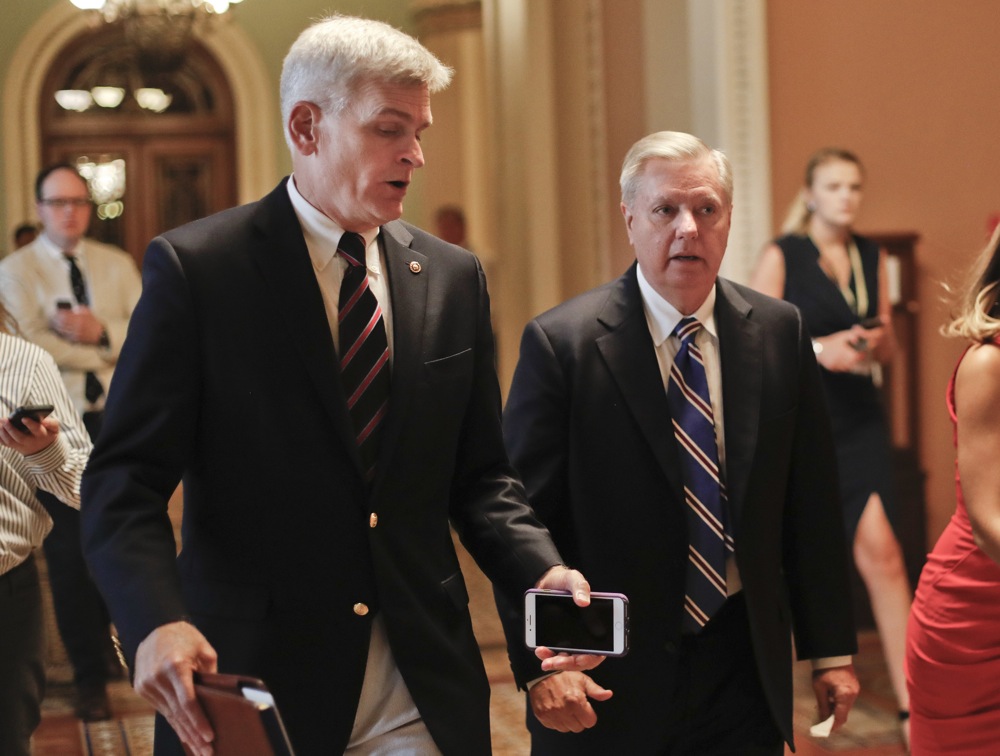GOP Senators Concerned Over Graham-Cassidy Bill in Wake of Outcry
As opposition grows, Republican lawmakers waver in their support of the new health care proposal, which is unlikely to pass if the Senate does not clear it by Sept. 30. Sen. Bill Cassidy, R-La., and Sen. Lindsey Graham, R-S.C., on Capitol Hill in July. (Pablo Martinez Monsivais / AP)
Sen. Bill Cassidy, R-La., and Sen. Lindsey Graham, R-S.C., on Capitol Hill in July. (Pablo Martinez Monsivais / AP)
Republican senators are tackling a health care overhaul plan yet again: The Graham-Cassidy bill, proposed by Sens. Lindsey Graham of South Carolina and Bill Cassidy of Louisiana, is the latest GOP attempt to repeal the Obama-era Affordable Care Act (ACA) and overhaul the country’s health care system.
As with the last two times the GOP took on the issue, however, senators are facing passionate opposition. Prominent health care groups, including the American Medical Association and the AARP, as well as a bipartisan group of governors, oppose the bill.
Even late-night television host Jimmy Kimmel spoke out against the bill, arguing that Sen. Cassidy, who had previously appeared on his show to discuss health care, lied “right to my face.”
Constituents are being urged to call potential swing-vote GOP senators, such as Sens. Lisa Murkowski of Alaska, Susan Collins of Maine and John McCain of Arizona. Republicans control the Senate 52 to 48, meaning the party can afford to lose only two Republican votes. So far, Sen. Rand Paul is the only Republican to outright oppose the bill; Murkowski, Collins and McCain are still considering the legislation.
“My issues are still how they derive the formula and how that works with the numbers for Alaska,” Murkowski said.
And while many Republican senators support the bill, some echoed Murkowski’s concern about how the bill affects their states, not the country as a whole. “I haven’t seen enough detail to know how it affects Alabama to have taken a position on it,” Sen. Luther Strange told Vox reporter Jeff Stein on Tuesday.
Stein said he spoke with 9 Republican senators about their stance on the Graham-Cassidy bill. Here are some other takeaways from his conversations:
- Sen. Pat Roberts of Kansas: “Restoring decision-making back to the states is always a good idea, but this is not the best possible bill—this is the best bill possible under the circumstances. If we do nothing, I think it has a tremendous impact on the 2018 elections.”
- Sen. John Kennedy of Louisiana: “I think it spends scarce resources in a more rational manner. It will control costs. I like the idea that it encourages states to innovate. … Read the bill and you’ll understand.”
- Sen. Richard Shelby of Alabama: “Our states—our 50 states—are very flexible, very innovative,” adding that the bill would not adversely affect his constituents.
- Sen. Johnny Isakson of Georgia: “I don’t know what the numbers are going to end up looking like. … I’m waiting until I see the totality of the legislation to say whether I support the whole thing or not, anyway.”
- Sen. John Barrasso of Wyoming: “[The bill] moves money out of Washington. It’s away from socialism.”
- Sen. Chuck Grassley of Iowa: “This is the last attempt to do what we promised in the election.”
-
Sen. Jim Inhofe of Oklahoma: “It’s a stronger position for the states to be in, and generally, Republicans agree with that…nothing protects everyone.”
Stein also spoke with Sen. Ted Cruz of Texas, who brought up the current lack of a congressional budget analysis for this round of legislation. “[The Congressional Budget Office’s] analysis throughout this process has been ridiculously slow, unreliable, and based on policy assumptions that are demonstrably false,” Cruz argued.
Although Cruz holds little faith in the CBO, the lack of an evaluation could be crucial for apprehensive Republican senators. “It’s difficult not having a CBO analysis to rely on,” Sen. Collins said. (Vox notes that the CBO must analyze the bill before it can come to a vote, as part of the Byrd Rule standards, “which require any bill considered under budget reconciliation to directly affect federal spending or revenue.”)
The pressure is certainly on, as this is the last chance Republicans have to pass health care legislation with only 50 votes. After Sept. 30, senators will need a 60-vote majority. Vox explains:
When Senate Republicans sought to repeal Obamacare earlier this summer, they did so through the budget reconciliation process. That process allows a bill to advance with only 51 votes, instead of the usual 60, which was essential to passing an Obamacare repeal bill: Republicans have only 52 members, and no Democrats would support repealing the health care law.
But the window for using budget reconciliation will soon close, according to Sen. Bernie Sanders (I-VT), who is the ranking Democratic member on the Senate Budget Committee. Sanders said in a statement that the Senate parliamentarian, who oversees the chamber’s arcane procedural rules, has decided that the current budget reconciliation privileges would expire at the end of September, the last day of this fiscal year.
When Congress passed a budget resolution earlier this year, it gave Republicans reconciliation privileges through the fiscal year, which ends September 30. But once they failed to repeal Obamacare, some Republicans had held out hope that they could keep the reconciliation process alive after September 30, as long as they didn’t pass a new budget resolution, and come back to it later.
Pressure is also reportedly coming from President Trump, who is openly disappointed with the GOP’s failure to pass health care so far. The White House has stated that Trump is prepared to sign the Graham-Cassidy bill should it land on his desk—and he’s also been making personal calls to various senators over the past week.
For opponents of the bill, the odds are looking good. Now that Sen. Paul has openly stated his “no” vote, Republicans can afford to lose only one more vote from their own party—or this iteration of GOP health care legislation will fail like the two bills before it.
Your support matters…Independent journalism is under threat and overshadowed by heavily funded mainstream media.
You can help level the playing field. Become a member.
Your tax-deductible contribution keeps us digging beneath the headlines to give you thought-provoking, investigative reporting and analysis that unearths what's really happening- without compromise.
Give today to support our courageous, independent journalists.






You need to be a supporter to comment.
There are currently no responses to this article.
Be the first to respond.